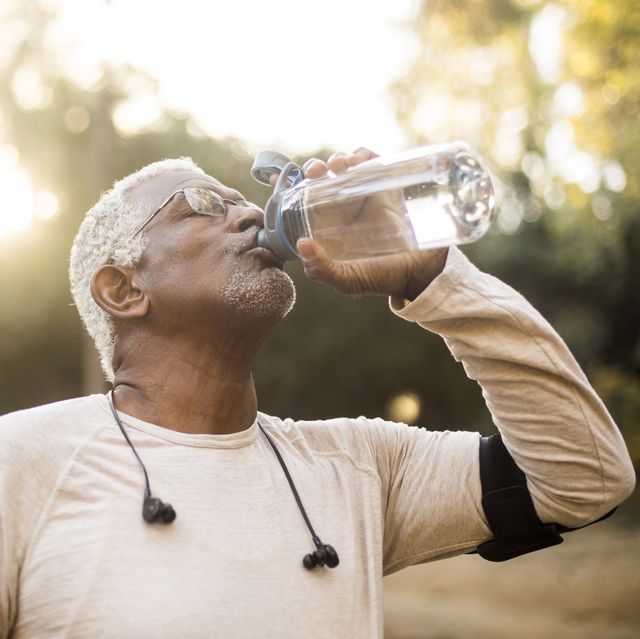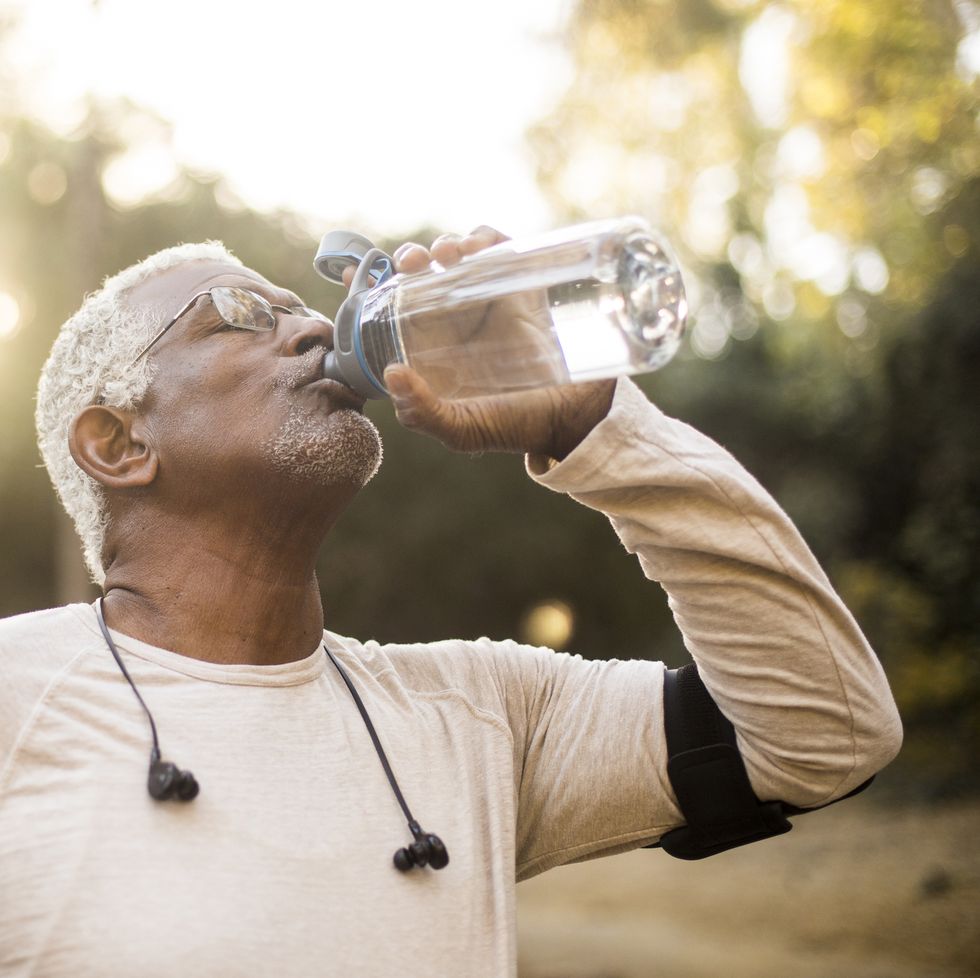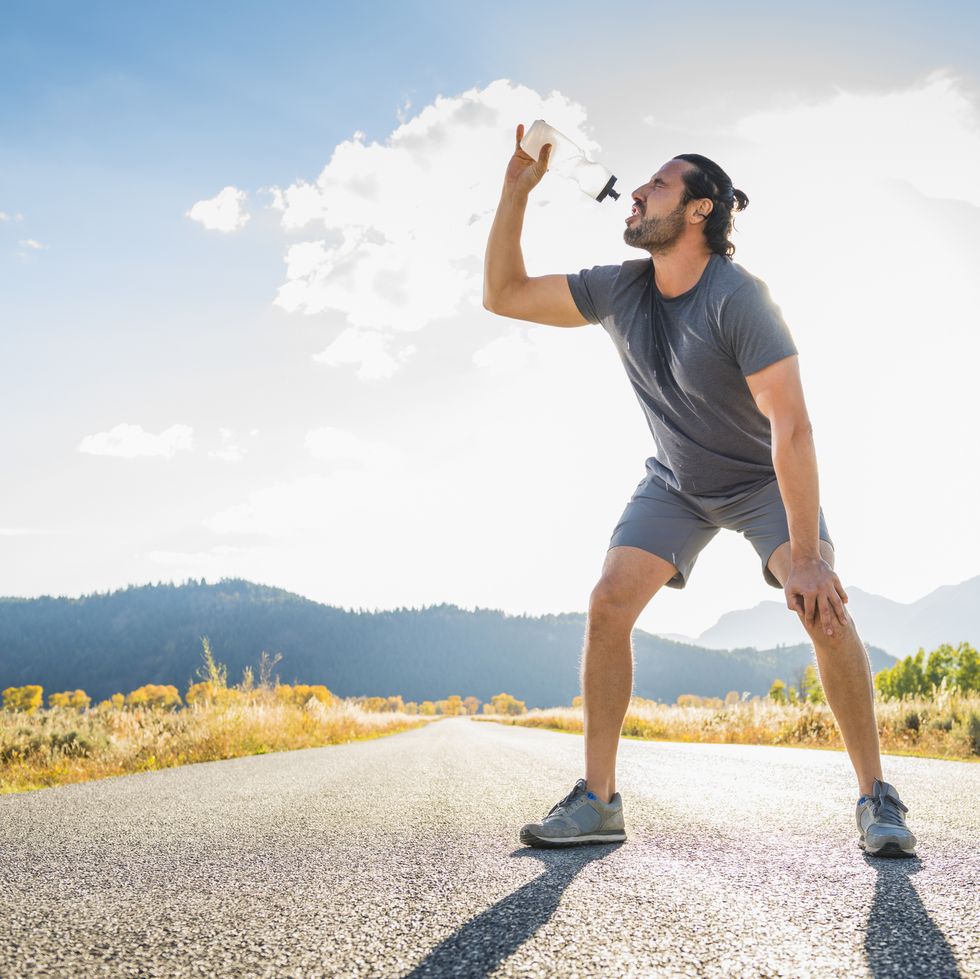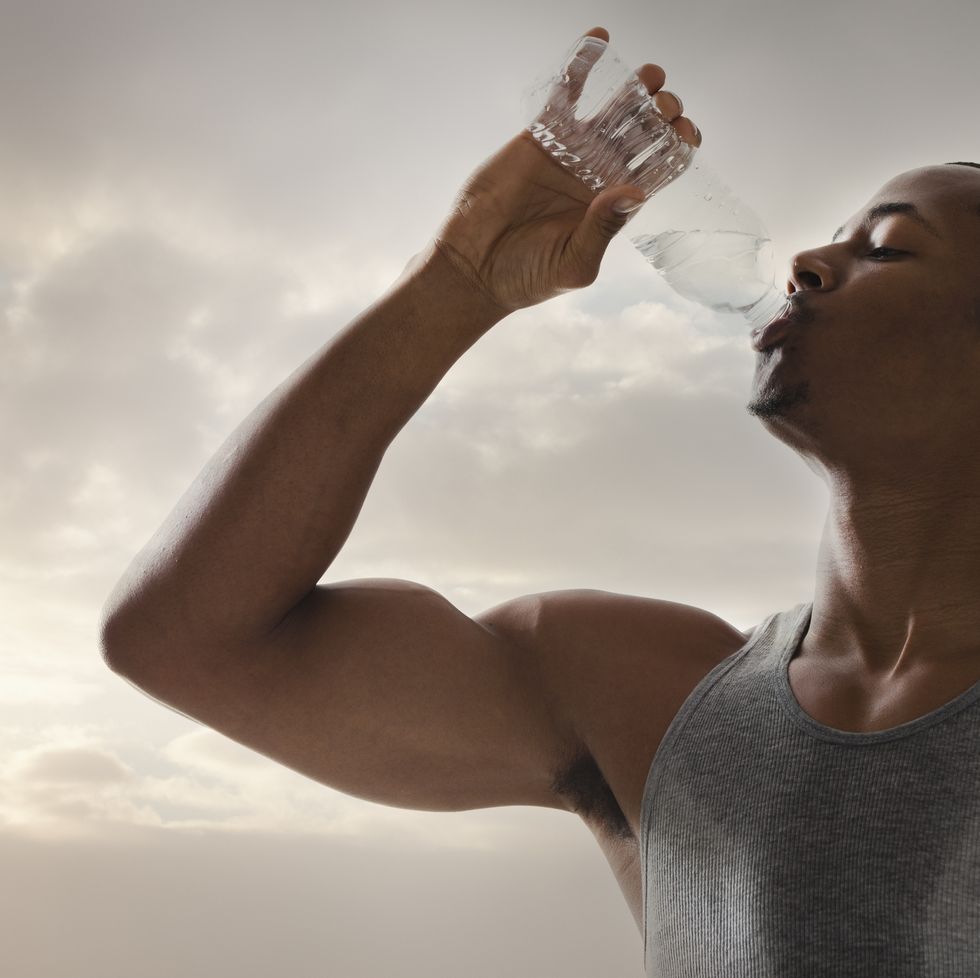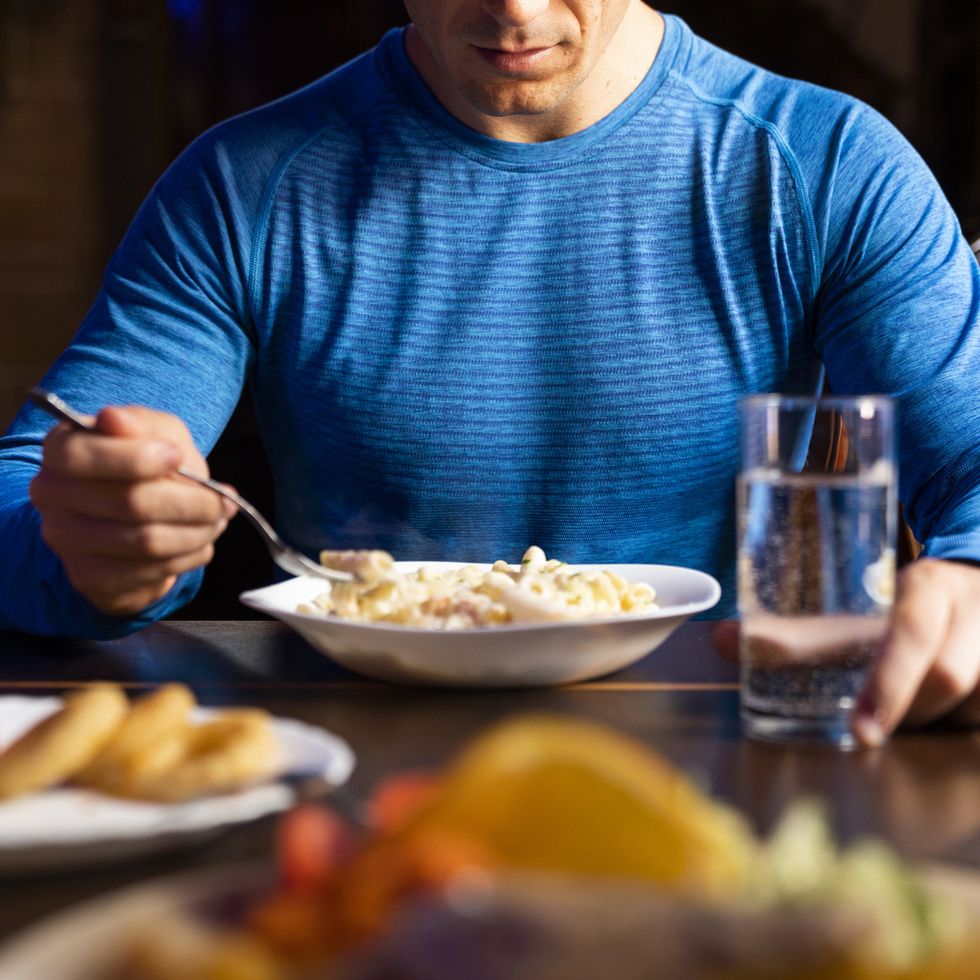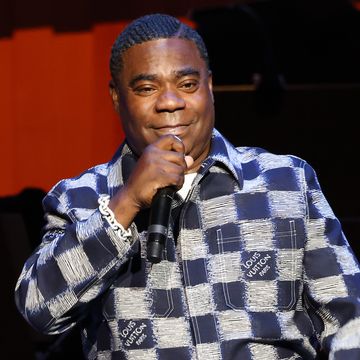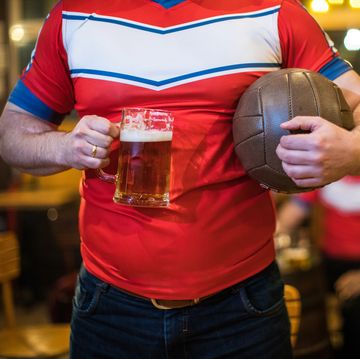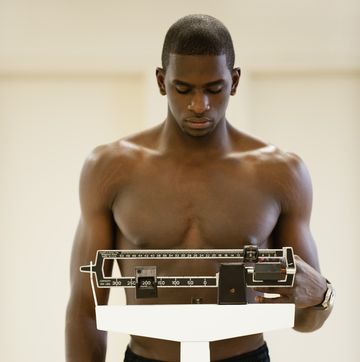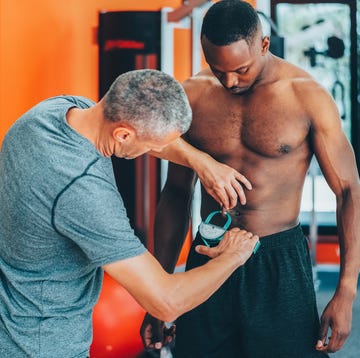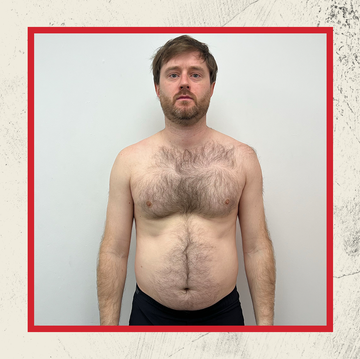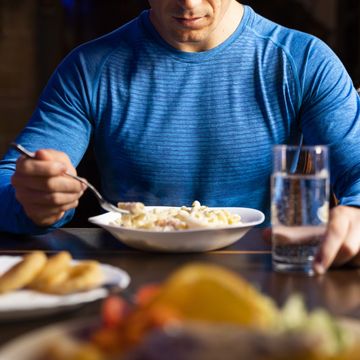IF YOU'VE RECENTLY started a weight loss journey, you understand just how many elements there are to consider when planning. Your grocery haul is primed, workouts are programmed, the perfect sleep schedule determined. Everything is all set up, but you may have forget to consider one major aspect that surrounds us all the time: water intake.
You need water to survive—that much is obvious. In a world full of Hydroflasks, Stanleys, and gallon water bottles bigger than your head, the importance of staying hydrated has never been more celebrated. The good news is you don't need a fancy, overpriced water bottle to drink your way to better health.
Nearly every function of the body relies on water in some capacity—proper hydration powers everything from joint lubrication to regulating body temperature, from supporting cell function to transporting nutrients and oxygen in the body. Dehydration can cause scary some consequences, too. Not only will your pee turn a nasty yellowish-brown color, you may grow confused and weak in severe cases.
It's not shocking, then, that water intake also plays a role in weight loss. If you're embarking on a weight loss journey, you may want to evaluate exactly how much water you're drinking. It's not as simple as it sounds, though—it's not just about drinking as much water as you can.
"Oftentimes water is pushed to those seeking weight loss because there is a belief that water can 'fill you up' leading to eating less often or less volume come meal time," says Kelly Jones, M.S., R.D.
So because you’re filling up on water, the theory goes, you’ll be less likely to snack and can better control your hunger. Plus, when you are hydrated and eating foods that have high water content, you are more likely to have better hydration overall throughout the day to help manage weight.
“Poor hydration can mean that your body continues to seek out fluid through the foods you are eating though, which is why sometimes people feel as if they may eat less when they have water before or at a meal,” Jones says.
There's some truth behind the claim that water can help you lose weight. That said, some so-called "experts" make it seem like H20 is an instant fat burner. Like, if you're not carrying around that Hydroflask full of water and drinking it at all times, weight loss is going to be a long, hard road for you.
Not true.
Think of water more as a maintenance tool, not a magic bullet, for weight loss.
Rather than trying to use water to mask your hunger, sip water regularly throughout the day in an attempt to prevent feelings of thirst (a sign you're already dehydrated), and then you may have better appetite regulation throughout the day.
"Along with well balanced meals and snacks, adequate hydration may help you better listen to your hunger and fullness cues, helping your body reach the weight it is meant to be over time," Jones says.
Still, though, beyond weight management, can water help you drop weight when you’re looking to slim down?
Can Drinking Water Help You Lose Weight?
You've heard the old adage: "If you're hungry, you might actually be thirsty."
This is only partially true.
Drinking water may help you curb your hunger in the short-term, but not so much long-term. "While the volume of food and liquids puts pressure on the nerve cells in your digestive tract, sending some signals to your brain that you may be full, it doesn't last for very long," Jones says.
You might feel full right after drinking lots of water, but you need a proper intake of protein, fat, and fiber, too, to trigger your satiety signals and truly feel full. Otherwise, once the water leaves your stomach later in the day, she says you might feel extreme hunger, be tempted to snack, choose not-so-healthy foods, and possibly over eat.
Water also raises your resting energy expenditure (REE), which refers to the calories your body burns at rest, by as much as 30 percent within 20 minutes of drinking water, says Dr. Linda Anegawa, M.D., a double board-certified physician in internal medicine and obesity medicine.
“REE is highly variable between individuals and is felt to be a major contributing factor to weight regulation,” she says.
So, in short, water can fill you up in a pinch, but only for a pinch.
Beyond weight loss, drinking plenty of water offers lots of other benefits that could aid in weight loss. Proper hydration gets rid of waste in the body through urination and sweating, regulates your body temperature, protects bodily tissues, and cushions your joints, according to Mayo Clinic.
How Much Water Should You Drink for Weight Loss?
Your body is made up of 60 percent water, so hydration is crucial for maintaining bodily processes, like circulation and energy production. Generally, everyone should drink six to eight 8-ounce glasses of water a day, Dr. Anegawa says. If you live in hot climates or exercise frequently, you likely need to drink even more.
On top of your baseline needs, experts recommend that you drink an additional 16 to 24 ounces of fluid starting around three hours before exercise, up to 1 liter an hour during exercise, and between 13 to 27 ounces per hour depending on the conditions of your workout, says Jones.
After your workout, you should replace whatever fluids you lost. By weighing yourself before and after your training session, you can calculate this need. "For every pound lost while moving, drink an additional 16 to 20 ounces on top of your baseline needs. Thirst is not a good indicator of hydration status and fluid needs," Jones says.
Increase your water intake, too, if you drink lots of caffeine throughout the day. Coffee, tea, and other caffeinated beverages can be dehydrating, Anegawa adds.
“You’ll know if you are drinking enough by checking the color of your urine, which should be a very pale yellow,” she says.
Constipation, dry mouth, fatigue, headaches, light-headedness, and a high heart rate but low blood pressure are signs you’re not getting enough water and may be headed for dehydration, according to Cleveland Clinic.
Can You Drink Too Much Water?
It is possible.
"When you drink more water than your kidneys can remove in your urine, this can cause too much water to collect in your bloodstream and an imbalance of fluids," says Maggie Michalczyk, M.S., R.D.
Women, more so than men, are more at risk for over-drinking water. But, men can still overdo it on hydration. Drinking too much weather can be life-threatening, though it’s rare.
"Excessive fluid intake occurs when the body has so much fluid that minerals such as sodium are diluted in the blood, leading to fluid imbalances in and out of cells," Jones says.
"Known as hyponatremia, or low blood sodium, it creates symptoms from nausea and fatigue to brain damage and death," she says.
This isn’t something to worry too much about, though—but it’s a risk associated with excess water intake.
Can Water Make You Weigh More?
Water weight is when the body retains fluids that would normally get filtered by the kidneys. "It's usually temporary and doesn't mean that you've gained weight, however can be discouraging for someone trying to lose weight," says Michalczyk.
It might happen for a few reasons. "An increase in salt in the diet, and sitting for long periods of time (like on a long flight) can all be reasons why people gain water weight," Michalczyk says.
Yet, you can help manage water weight. "Avoiding salty foods (like processed foods that usually contain a lot of salt), drinking enough water, and exercising are all ways to prevent water weight and get it to go away," Michalczyk says.
Carbs can also have an impact on fluid retention because glycogen (the storage form of carbohydrates) pulls in water.
"This explains why people on a crash diet with very little carbs lose weight right away but then tend to gain it right back when they resume their normal diet," Michalczyk says. It's water weight that is being lost from the stored glycogen in your muscles—just another reason why slow, sustained weight loss is the way to go.
Do I Have to Drink Water to Lose Weight?
Well, yes, everyone has to drink water, but we know what you're getting at: Can you drink other things that aren't water because water tastes so, well, boring?
“If drinking plain water doesn’t appeal to you, there are ways to spice things up,” Anegawa says. “Drink sparkling water or add a touch of sugarless flavoring, such as mint leaves or a slice of lime, to your water.”
Keep in mind that fluids that aren't water, like sports drinks, vitamin waters, and flavored waters, often contain empty calories—the enemy of healthy diets. “If one consumes sports drinks for the electrolyte content, I always recommend steering clear of beverages that contain sugar,” Anegawa says.
Make your own sports drink by adding a squeeze of citrus fruit and a pinch of salt to your water, she says.
How Can I Increase My Water Intake?
If you’re not in the habit of drinking water regularly, it’s easy enough to add better hydration to your daily health routine. “There are tools to help remind you to drink water, which are great for those with a busy lifestyle,” Anegawa says. Apps, like Daily Water Tracker or WaterMinder, will send you reminders to sip the H2O.
If you're not a fan of water, there are a few other options that can trick you into getting your water in. Seltzer is a good non-water option. It’s usually no-calorie and extremely flavorful. That said, pounding seltzer after seltzer might leave you feeling a little bloated.
The Bottom Line
Yes, water can assist in weight loss by helping control your appetite and derailing you from picking sugary drinks to quench your thirst. But, drinking water alone won’t really tip the scale for long-term changes.
